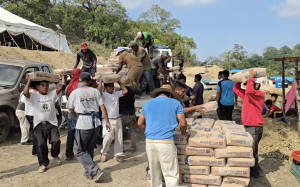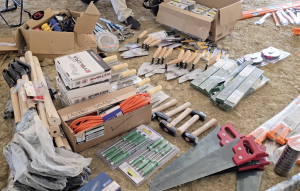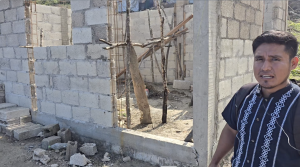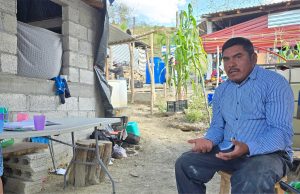 Members of the Great Commission Baptist Church from Coamila and Rancho Nuevo villages in southern Mexico’s Hidalgo state have begun to settle in a new location in the neighbouring state of Veracruz. The 151 Christians in the group were forced out of their villages by a concerted campaign against them last year by village authorities who cut off electricity and water, vandalised their church building and blocked access to some of their homes.
Members of the Great Commission Baptist Church from Coamila and Rancho Nuevo villages in southern Mexico’s Hidalgo state have begun to settle in a new location in the neighbouring state of Veracruz. The 151 Christians in the group were forced out of their villages by a concerted campaign against them last year by village authorities who cut off electricity and water, vandalised their church building and blocked access to some of their homes.
 For some time after moving to Veracruz in October 2024, the group was forced to shelter in tarpaulins (unsuitable makeshift tents with little protection from the weather) but following the receipt of aid supplied by Church in Chains via its partner Christian Solidarity Worldwide, more permanent homes have begun to be built – erected by members of the church community, many of whom are gifted in construction. The aid paid for the purchase of building materials and tools.
For some time after moving to Veracruz in October 2024, the group was forced to shelter in tarpaulins (unsuitable makeshift tents with little protection from the weather) but following the receipt of aid supplied by Church in Chains via its partner Christian Solidarity Worldwide, more permanent homes have begun to be built – erected by members of the church community, many of whom are gifted in construction. The aid paid for the purchase of building materials and tools.
They have named their new community “La Paz (Peace)” and a recent progress report states, “It is admirable how they continue to work in faith every day, trusting in God for His provision, even though they do not know very well how God will provide.
 “They have been able to finish the walls and roofs of the 42 houses and are now working on the construction of the temple and school. They are also working on building toilets for each house, since the land they arrived at or where they are building does not have sewage, as it was agricultural land.”
“They have been able to finish the walls and roofs of the 42 houses and are now working on the construction of the temple and school. They are also working on building toilets for each house, since the land they arrived at or where they are building does not have sewage, as it was agricultural land.”
Background
 The church traces its origins back to 2015, when Rogelio Hernández Baltazar (pictured) returned to his community in Rancho Nuevo in Hidalgo State in southern Mexico after spending several months working in the fields of Coahuila in Northern Mexico. While working there a colleague invited him to the local Baptist church, where he made the decision to convert to Christianity. On his return, local people noticed a change in the character of a man previously known for drunkenness and an angry disposition. Rogelio explained the change was due to what he had read in the Bible and he invited people to Bible studies in his home.
The church traces its origins back to 2015, when Rogelio Hernández Baltazar (pictured) returned to his community in Rancho Nuevo in Hidalgo State in southern Mexico after spending several months working in the fields of Coahuila in Northern Mexico. While working there a colleague invited him to the local Baptist church, where he made the decision to convert to Christianity. On his return, local people noticed a change in the character of a man previously known for drunkenness and an angry disposition. Rogelio explained the change was due to what he had read in the Bible and he invited people to Bible studies in his home.
Three families started attending the Bible studies and a church subsequently formed, which they called “The Great Commission”. Rogelio became the pastor, even though he had no formal education, and persecution from leaders in the local community soon followed.
The majority religion in the local community is a folk Catholicism that blends pre-Hispanic Mayan practices with Catholicism in a syncretic Christo-pagan religion. Community life centres on religious festivals that involve heavy drinking and pagan elements. Every family is expected to participate in the festivals and those who refuse to participate due to different religious beliefs are often persecuted.
In 2018, the children of families who attended the church (now numbering 19 families) were excluded from attending primary school. In the following years, violence and discrimination continued. It was normal for Rogelio and some of the leaders of the church to be confronted in the street, or for drunken men to bang on the fragile wooden doors of the church and its members’ houses with sticks and machetes, seeking to intimidate those they considered to be the cause of disunity within the community.
Despite the persecution, the church continued to grow and numbered 151 people in April 2024 when they were forced out of their villages. After six months living in a sports complex, they were permitted to return home, but were displaced again a month later when local authorities reneged on the agreement allowing them to move back into their homes.
(Christian Solidarity Worldwide)
Photo Credits: Christian Solidarity Worldwide
